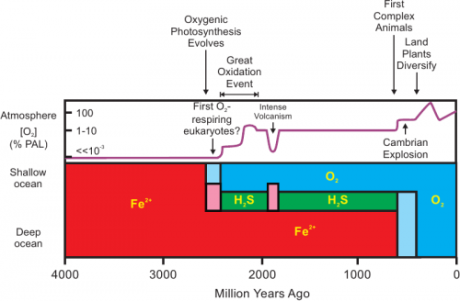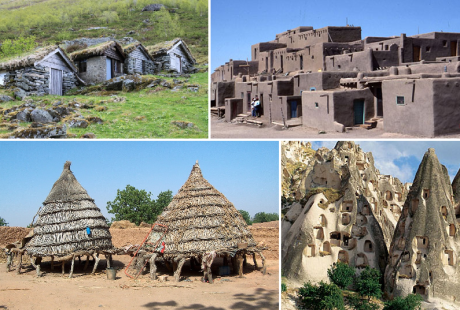The Ecological Conception of Civilization
9 May 2016
Monday
Recently in The Biological Conception of Civilization I defined civilization as a tightly coupled cohort of coevolving species. In proposing this definition, I openly acknowledged its limitations. This biological conception of civilization defines a biocentric civilization, and if civilization continues in its technological development, it may eventually pass from being a biocentric civilization, dependent upon intelligent organic species originating on planetary surfaces, to being a technocentric civilization, no longer dependent in this sense.
Even given these limitations of the biological conception of civilization, we need not abandon a biological framework entirely to converge upon a yet more comprehensive conception of civilization, beyond the biocentric, but still roughly characterized by conditions that we have learned from our tenure on Earth. Being ourselves an intelligent organic species existing on the surface of a planet, biological modes of thought can be made especially effective for minds such as ours, and it is in our cognitive interest to cultivate a mode of thought for which we are specially adapted.
Let us, then, go a little beyond a strictly biological conception of civilization and formulate an ecological conception of civilization. To make this conception immediately explicit, here is a first formulation…
The Ecological Conception of Civilization:
Civilization is niche construction by an intelligent species.
This formulation of the ecological conception of civilization could be amended to read, “by an intelligent species or by several intelligent species,” in order to anticipate the possibility of intelligence-rich biospheres that give rise to civilizations constituted by multiple intelligent species.
What is niche construction? Here is a sketch of the idea from a book on niche construction:
“…organisms… interact with environments, take energy and resources from environments, make micro- and macrohabitat choices with respect to environments, construct artifacts, emit detritus and die in environments, and by doing all these things, modify at least some of the natural selection pressures present in their own, and in each other’s, local environments.”
Niche Construction: The Neglected Process in Evolution, F. John Odling-Smee, Kevin N. Laland, and Marcus W. Feldman, Monographs in Population Biology 37, Princeton University Press, 2003, p. 1
The authors go on to say:
“All living creatures, through their metabolism, their activities, and their choices, partly create and partly destroy their own niches, on scales ranging from the extremely local to the global.”
Ibid.
Human interaction with the terrestrial environment is an obvious example of taking energy and resources from the environment on a global scale, altering the selection pressures on our own evolution as a species by both creating and destroying a niche for ourselves. We are not the first terrestrial organisms to act upon the planet globally; when stromatolites (microbial mats composed of cyanobacteria) were the dominant life form on Earth, their photosynthetic processes ultimately produced the Great Oxygenation Event and catastrophically changed the biosphere. Had it not been for that global catastrophic change of the biosphere, oxygen-breathing organisms such as ourselves could not have evolved.

‘The Great Oxygenation Event (GOE), also called the Oxygen Catastrophe, Oxygen Crisis, Oxygen Holocaust, Oxygen Revolution, or Great Oxidation, was the biologically induced appearance of dioxygen in Earth’s atmosphere.’ from Wikipedia (https://en.wikipedia.org/wiki/Great_Oxygenation_Event)
Though we are not the first terrestrial organism to shape the biosphere entire, we are the first intelligent terrestrial agents to shape the biosphere, and it has been the application of human intelligence to the problem of human survival that has resulted in human beings adapting their activity to every terrestrial biome and so eventually constructing civilization. At the stage of the initial emergence of civilization, the biological and ecological conceptions of civilizations coincide, as niche construction takes the form of engineering a coevolving cohort of species beneficial to the intelligent agent intervening in the biosphere. In later stages in the development of civilization, the ecological conception is shown to be more comprehensive than the biological conception of civilization, and subsumes the biological conception of civilization.
Not any cohort of coevolving species constitutes a civilization. Pollinating insects (bees) and flowers are involved in what might be called a tightly-coupled cohort of coevolving species, but we could not call bees and flowers together a civilization. Perhaps on other worlds the distinction between what we call civilization and coevolution in the natural world would not be so evident, and we could not as confidently make the distinction. For us, however, this distinction seems obvious. Why? At least one difference between civilization and naturally occurring coevolution is that the tightly-coupled cohort of coevolving species that we call civilization has been purposefully engineered for the benefit of the intelligent species that has demonstrated its agency through this engineering of a niche for itself. Moreover, the engineered niche is entirely dependent upon ongoing intervention to maintain this engineered niche. In the absence of civilization, the tightly-coupled cohort(s) of coveolving species would unravel, while naturally occurring instances of coevolution would continue unchanged, i.e., they would continue to coevolve. (I leave it as an exercise to the reader to compare this observation to Schrödinger’s definition of life in thermodynamic terms.)
The necessary role of an intelligent agent in maintaining a coevolutionary cohort of species points beyond the biological conception of civilization to the ecological conception of civilization, which in term points beyond civilizations constructed by biological agents to the possibility of niches constructed by any intelligent agent whatsoever. This makes the ecological conception of civilization more comprehensive than the biological conception of civilization, as the intelligent agents involved in niche construction need not be biological beings. However, biological beings are likely to be the intelligent agents with which civilization begins.
In the kind of universe we inhabit, during the Stelliferous Era biology represents the first possible emergence of intelligent agency, hence the first possibility of intelligent niche construction. (I could hedge a bit on this and instead assert that biological agents are the first likely emergence of intelligent agents, as Abraham Loeb has posited the possibility of life in the very early universe — cf. “The Habitable Epoch of the Early Universe” — but I consider this scenario to be unlikely, and the possibility of such life yielding civilization even less likely.) This biocentric possibility of intelligent niche construction can later be supplemented or replaced by later forms of emergent complexity consistent with intelligent agency and capable of niche construction (which latter could involve either building on existing forms of intelligent niche construction or innovating new forms of intelligent niche construction transcending what we today understand as civilization).
The biological conception of civilization — an engineered coevolving cohort of species — constitutes one possible form of niche construction. That is to say, in managing an ecosystem so that it produces a disproportionate number of the plants and animals consumed as food or other products for the use of the directing intelligent agent (human beings in our case), human beings have attained the first possible stage of intelligent niche construction, which is essentially a delineation of biocentric civilization, but the ecological conception of civilization can be adapted to the understanding of non-biocentric civilizations, as, for example, in the case the technocentric civilizations. The various kinds of civilization that we have seen on Earth — including but not limited to agrarian-ecclesiastical civilization and industrial-technological civilization — represent distinct forms of intelligent niche construction, and therefore all fall within the ecological conception of civilization. Civilizations constructed by post-biological agents in the form of technological beings may build upon these constructed niches or construct niches more distinctly adapted to post-biological agents (which may be technological agents).
The ecological conception of civilization lends itself to technocentric extrapolation in so far as the ecological recognition of the biology of planetary endemism being dependent on solar flux is readily adapted to conceptions of civilization that have emerged from the work of Dyson and Kardashev. Dyson famously imagined stars so surrounded by the productions of a technological civilization that only the waste heat of these civilizations would be visible to us in the infrared spectrum, and Kardashev equally famously translated this idea into a formalism representing civilization types in terms of total energy resources commanded by a civilization. Even these distant extrapolations of the possibility of our technological civilization are still recognizably dependent upon stellar flux, no less than the biomass of our terrestrial environment is dependent upon solar flux, as stellar flux represents the primary source of readily available energy during the Stelliferous Era. In this way, even technocentric civilizations constructed by post-biological intelligent agents are continuous with the civilizations of planetary endemism emerging from the biology of planetary surfaces, and both are describable in ecological terms.
It could be said that the ecological conception of civilization presupposes the biological conception, because ecological systems supervene on biological systems (or, at least, ecological systems have supervened upon biological systems to date, but this is not a necessary relationship and may be superseded in the fullness of time), and an ecological perspective provides a conceptual framework placing civilization in the context of the natural world from which it emerged and upon which it depends, as well as placing any given civilization in the context of other civilizations. This latter function — providing a systematic framework for the interaction of civilizations — ultimately may be the most valuable aspect of the ecological conception of civilization, but one that can only be suggested at present. The ecological relationships familiar to us from the study of living organisms — mutualism (or symbiosis), commensalism, predation, and parasitism — may hold for civilizations also, but this kind of parallelism cannot be assumed. The ecological relationships among civilizations — i.e., among intelligent species that have engaged in niche construction — may well be more complex than the ecological relationships among organisms, but this is a matter for further study that I will not attempt to elaborate at present.
. . . . .
. . . . .
. . . . .
. . . . .
. . . . .







